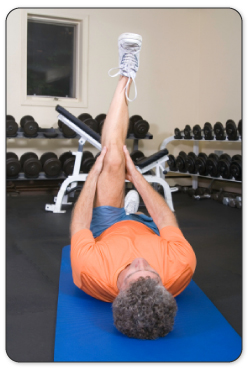Preventing a hamstring injury is better than having to heal one after it happens, unfortunately it is not always possible. However, there are a number of things you can do to keep your hamstrings healthy and strong to reduce the risk of injury or to prevent further damage.

Proper food and fluid intake prior to and/or during activities will ensure you have enough energy and will help to prevent against fatigue. Ensure you avoid dehydration which can lead to muscle cramping.
Weight loss and/or weight maintenance involves eating a balanced diet full of protein, complex carbohydrates, fats, vitamins, minerals, phytochemicals and antioxidants which will help support a healthy system. If you gain just 10 pounds, your joints must bear from 25 up to 100 pounds extra, which can add unnecessary stress to your body. Limiting your caffeine, alcohol and nicotine consumption will also improve your health.

Maintain a strong and proper posture, and wear proper footwear and gear for your activity. This will ensure your body is properly aligned, and will prevent against slouching or bad form which will make you more prone to injury.
Always learn the proper form and techniques for your activity to help prevent injuries.
Your equipment should be comfortable and provide enough padding (knee or thigh pads), and your shoes should provide sufficient sole stiffness and arch support.
Hamsting injuries are not always a result of tight hamstring muscles. Often, it is a tight hip flexor or weak gluteal muscles (muscles in the butt) that are the cause as both put greater strain on the hamstring muscles during running and other activities. By strengthening your glutes and stretching your hip flexors before exercising you can reduce the chance of suffering a hamstring injury.
If you are suffering from hamstring pain, listen to your body and decrease, modify and/or avoid any activities or motions that cause pain and irritation (quick stopping/starting, turning, running or jumping, as well as participating on uneven terrain). If you are required to perform these motions at work or play and cannot avoid them, make sure you take frequent breaks and rest to prevent fatigue and pain.
Before beginning exercise or training, ask your doctor or physical therapist for a list of appropriate exercises that will not cause further harm to your weak hamstrings while you work to strengthen them.

To stabilize your hamstring and leg area, and increase your range of motion, maintain and build your strength, stability and flexibility of your hamstring, leg, gluteal, pelvis, low back and core body muscles. Light weights, exercise bands and balls are very beneficial for strengthening your lower body. Procioceptive training (core balance training) and plyometrics (exercises to develop strength, speed and agility, such as jumping or bounding movements) are also an excellent addition to your exercise routine. Yoga, tai chi, or a daily stretching routine will help to keep your muscles and joints supple (avoid sudden twisting and turning motions).
A regular exercise program that focuses on total body fitness and includes low-impact aerobic activity at least 3 days per week, such as walking, swimming or biking will help to keep you healthy overall and will strengthen your body to prevent against further hamstring injuries.
Give your body an opportunity to build up its endurance. This is especially important when participating in a new activity. Gradually increase your participation to prevent overstraining your muscles.
Hamstring injuries are frustrating to live with and healing can take a long time because it's difficult to give your leg the rest it needs. This is especially true for runners and other athletes that return to their sport too early. Re-injury is common but it prolongs recovery and may also lead to permanent damage and other conditions.
Treating your hamstring strain correctly is essential to getting rid of your pain and restoring function to your upper thigh. Proper treatment will get you back to regular activities sooner, stop your pain, and reduce the risk of future re-injury.
To learn how to treat a hamstring pull, go here to our treatments page.
AidYourHamstring advisors do not work on commission, so be assured you will only receive fair and objective information.
Product Advisors are available 9:00 am to 5:00 pm Eastern Standard Time Monday to Friday.
I want to learn more about Surgery & Post-Surgery Recovery
I want to learn more about Circulation Boost
I want to learn more about Ice & Heat: Which Is Better For Treatment?
I want to learn more about Stretching for the Hamstring
I want to learn more about Soft Tissue Injury Treatments
During your recovery, you will probably have to modify and/or eliminate any activities that cause pain or discomfort at the location of your soft tissue injury until the pain and inflammation settle. The more diligent you are with your treatment and rehabilitation, the faster you will see successful results!
Please be aware that this information is neither intended nor implied to be a substitute for professional medical advice. CALL YOUR HEALTHCARE PROVIDER IMMEDIATELY IF YOU THINK YOU MAY HAVE A MEDICAL EMERGENCY. Always seek the advice of your physician or other qualified health provider before using any of our outstanding products to make sure they are right for you and your condition or if you have any questions regarding a medical condition. Always see your doctor for a proper diagnosis as there are often many injuries and conditions (some very serious) that could be the cause of your pain.
© 2025 In.Genu Design Group, Inc. Contact Us